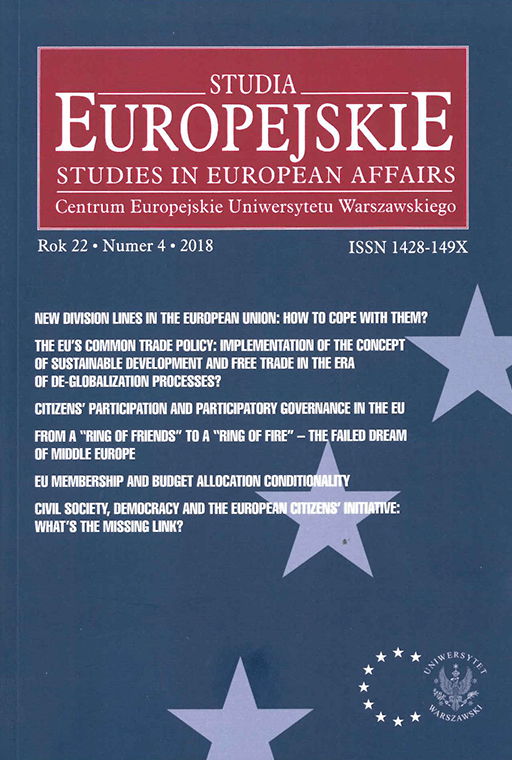
ISSUE: 4/2018
- Volume 22
- Number 4
- 2018
Subscribe NEWSLETTER
Studia Europejskie –
Studies in European Affairs
ISSN: 1428-149X
e-ISSN: 2719-3780
License
Articles published in the journal are under a Creative Commons Attribution – Non Commercial – No Derivatives 4.0 International License
Germany and the Common Security and Defense Policy
Abstract
In the face of changes taking place in the global order and challenges in the immediate vicinity of the European Union, the member states are forced to redefi ne their own security priorities. The directions of the desired changes in the EU Common Security and Defense Policy have the subject of numerous discussions and analyses. One of the key countries that have a significant impact on the architecture of European security is Germany. That is why the main goal of the article is to answer the question about the role and importance of Germany in shaping the European Union’s security policy. The main conclusion resulting from the conducted analysis is the following: in the fi eld of security policy, Germany’s attitude is characterized by high ambivalence between the implementation of foreign policy goals by means of the so-called soft instruments and the necessity and inevitability of increasing its own military involvement. The resolution of this dilemma is fundamental to the future architecture of the Common Security and Defense Policy.
References
Bendiek A., The Global Strategy for the EU’s Foreign and Security Policy, “SWP Comment 38”, 2016.
Bund J., Fiott D., Tardy T., Stanley-Lockmann Z., EUISS Yearbook of European Security, 2017.
Ciupiński A., Wspólna Polityka Bezpieczeństwa i Obrony Unii Europejskiej. Geneza. Rozwój. Funkcjonowanie, Difin, Warszawa 2013.
Chojan A., Europejska Służba Działań Zewnętrznych – postęp czy regres w politycznej integracji Europy? , “Myśl Ekonomiczna i Polityczna”, no. 1/2012.
Czekaj A., Usewicz T., Koncepcja sieci węzłów transportowych na potrzeby Wspólnej Polityki Bezpieczeństwa i Obrony Unii Europejskiej, “Unia Europejska.pl”, no. 3/2017.
Europa muss handlungsfähig sein – nach außen und innen, „Frankfurter Allgemeine Sonntagszeitung“, 3.06.2018.
Fiszer J.M., Zadania i cele polityki zagranicznej Władimira Putina , “Myśl Ekonomiczna i Polityczna”, no. 1/2016.
Gliere C. (ed.), European security and defence: Core documents 2007, ISS EU, “Chaillot Paper” Paris, vol. VIII/2007.
Gotkowska J., The Trouble with PESCO. The Mirages of European Defence, “Point of View” no. 69/2018.
Gotkowska J., Renesans wspólnej polityki bezpieczeństwa i obrony UE. Szanse i wyzwania dla wschodniej flanki, “Komentarze OSW”, no. 243/2017.
Holko M., Disintegration of European Union, “Journal of Modern Science”, vol. 2, no. 29/2016.
Karlas J., Europe’s Foreign and Security Policy: The Institutionalization of Cooperation, Cambridge University Press, Cambridge 2004.
Konarzewska A., Grupy Bojowe UE. Zaczątek Euroarmii?, “Bezpieczeństwo Narodowe”, no. 3–4/2007.
Koziej S., Polityka Bezpieczeństwa i Obrony Unii Europejskiej: od Strategii Globalnej do PESCO (Security and Defense Policy of the European Union: from the Global Strategy to PESCO), “Pulaski Policy Papers”, no. 1/2018.
Koziej S., Strategia globalna Unii Europejskiej jako koncepcyjny fundament bezpieczeństwa europejskiego (The global strategy of the European Union as a conceptual foundation for European security), “Myśl Ekonomiczna i Polityczna”, no. 4/2017.
Linnenkamp H., Germany and the CSDP, in: The Common Security and Defence Policy: National Perspectives, ed. D. Fiott, EGMONT, Brussels
2015.
Miszczak K., Polska i Niemcy a realizacja Wspólnej Polityki Zagranicznej, Bezpieczeństwa i Obrony Unii Europejskiej (Poland and Germany in the global strategy of the European Union as a conceptual foundation for European security), “Krakowskie Studia Międzynarodowe”, no. 1/2016.
Miszczak K., Przyszłość Polityki Bezpieczeństwa i Obrony Unii Europejskiej, “Krakowskie Studia Międzynarodowe”, no. 1/2017.
Piskorska B., Nie tylko miękka siła: Unia Europejska jako aktor w dziedzinie bezpieczeństwa europejskiego, „Roczniki Nauk Społecznych”, no. 3/2013.
Piskorska B., Nowa strategia na nowe czasy – konieczność redefi nicji polityki zagranicznej Unii Europejskiej w jej sąsiedztwie, “Myśl Ekonomiczna i Polityczna”, no. 4/2015.
Posen B.R., European Union Security and Defense Policy: Response to Unipolarity?, “Security Studies”, vol. 15/2006.
Sandawi S., Gemeinsame Sicherheits- und Verteidigungspolitik, „Jahrbuch der Europäischen Integration“, 2010.
Stacey J.A., Merkel’s Military Revival, http://foreignpolicy.com/2018/03/28/merkels-military-revival/.
Stańczyk J., Grupy Bojowe jako instrument polityki reagowania kryzysowego Unii Europejskiej, “Studia Europejskie”, no. 4/2009.
Stańczyk J., Znaczenie Grup Bojowych w rozwoju Wspólnej Polityki Bezpieczeństwa i Obrony Unii Europejskiej, “Doctrina. Studia Społeczno-Polityczne”, no. 6/2009.
Steinmeier F-W., Europa ist die Lösung. Churchills Vermächtnis, Ecowin Verlag, Wals bei Salzburg 2016.
Stępniewski T., European Union Battlegroups – Challenges and Risks at the Time of Brexit, “Myśl Ekonomiczna i Polityczna”, no. 4/2017.
Szubart K., Unia Europejska „dwóch prędkości”? Niemcy i WPBiO po Brexicie, “Biuletyn Instytutu Zachodniego”, no. 281/2016.
Usewicz T., Brexit i jego konsekwencje dla Wspólnej Polityki Bezpieczeństwa i Obrony Unii Europejskiej, “Rocznik Bezpieczeństwa Międzynarodowego”, vol. 11, no. 1/2017
Language: English
Pages: 85-96
How to Cite:
Harvard
Dahl, M. (2018) "Germany and the Common Security and Defense Policy". Studia Europejskie – Studies in European Affairs, 4/2018, pp. 85-96.